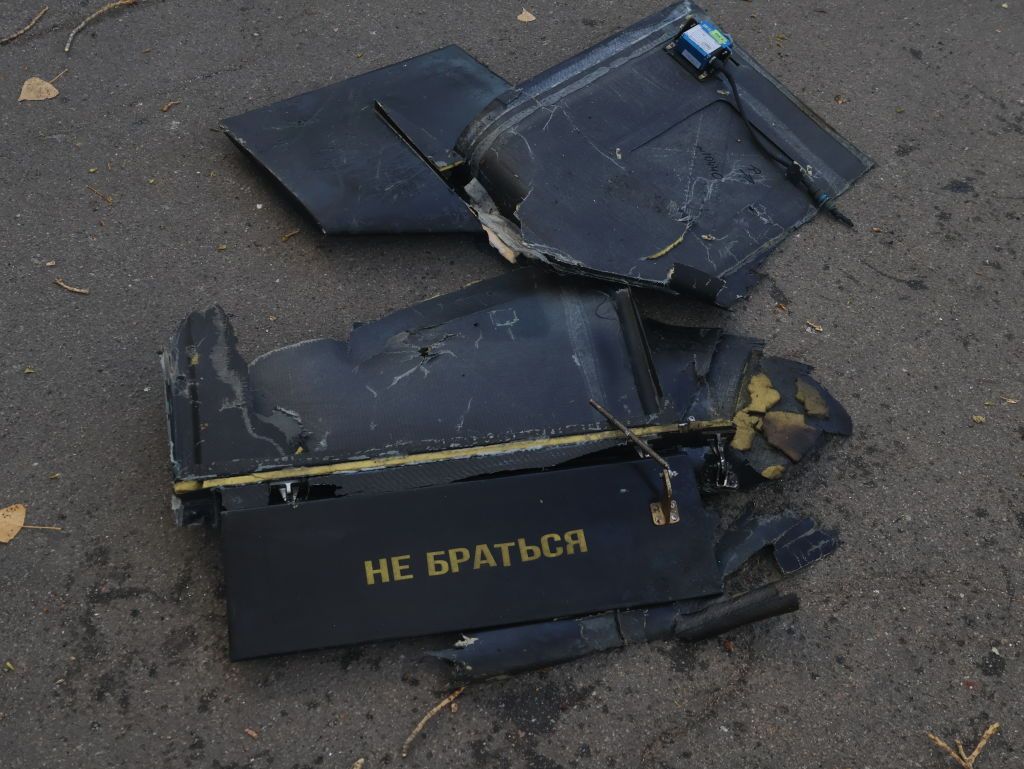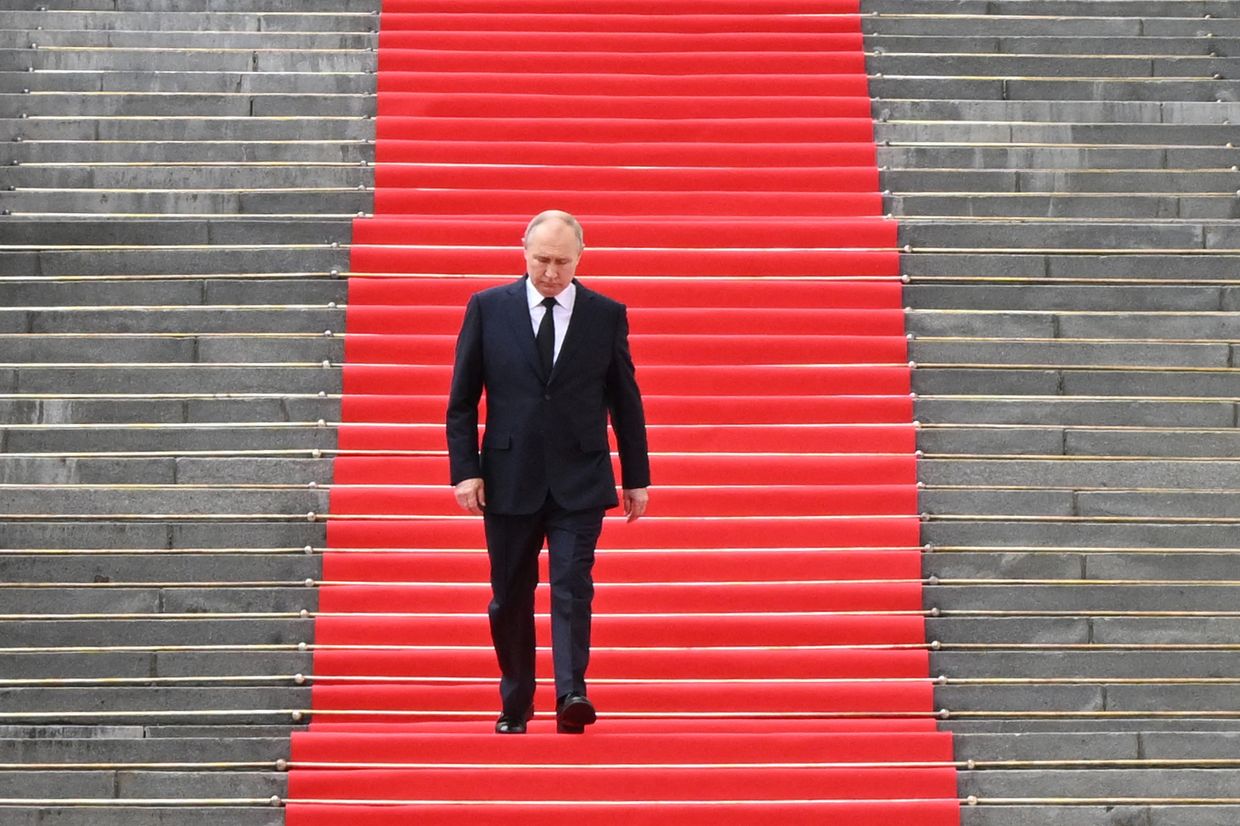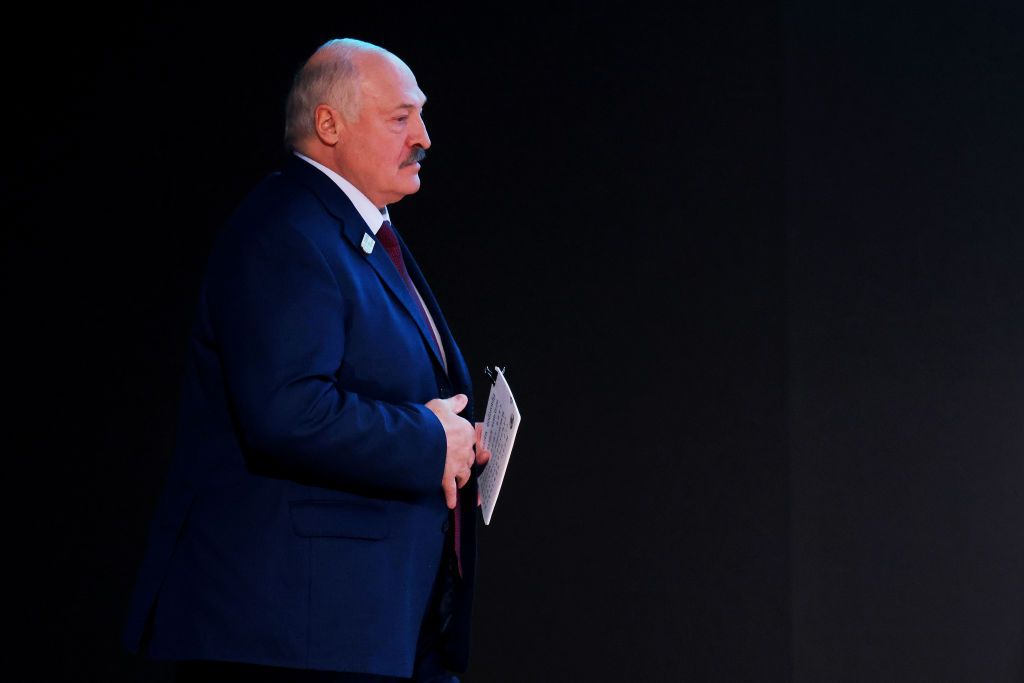Thirty-eight Russian combat drones enter Belarus on Nov. 24-25, marking the most significant overnight incursion so far and nearing the previous monthly record.
Alexander Lukashenko threatens to shut down the internet in Belarus should protests occur during the 2025 presidential election.
A Belarusian who fought on behalf of Ukraine as a volunteer against Russia faces over 20 years of prison time or potentially a death penalty under Lukashenko’s regime after being denied residence in the EU and extradited from Vietnam to Belarus.
Lukashenko “pardoned” 32 more political prisoners in the sixth round of releases. The total count so far: 178 people released, yet 223 newly recognized political prisoners were added, Viasna reported.
Seven hundred Belarusian activists, journalists, and Kastus Kalinouski Regiment volunteers were added to Russia’s wanted list.
Record 38 Russian combat drones cross into Belarus overnight, Belarusian Hajun reports
Thirty-eight Russian Shahed-type kamikaze drones flew into Belarus overnight on Nov. 24-25, marking an absolute record of daily incursions, the monitoring group Belarusian Hajun reported.
As Russia continues to intensify its drone attacks against Ukrainian cities, incursions of Russian drones into Belarus surged from infrequent, isolated instances in July to 27 stray drones spotted over Belarus in September. The daily incursions record runs up close to a monthly total of 49 incursions recorded in October.
Belarusian aviation scrambled to intercept the UAVs four times, shutting down at least one, Belarusian Hajun says. Dozens of drones crossed through the so-called “Belarusian corridor,” a narrow strip of Belarusian territory sandwiched between the Kyiv and Chernihiv oblasts of Ukraine.
In an attack on Nov. 24-25, Russia launched a total of 145 drones at Ukrainian targets overnight, with Ukrainian air defenses downing 71 of the attack drones, Ukraine’s Air Force said.
The official Minsk has never publicly raised objections to Moscow — its key ally — over the reported drone incidents. Belarusian authorities have confirmed downing a Russian drone over its territory for the first time on Sept. 5.

Belarusian authoritarian leader Alexander Lukashenko claimed on Oct. 4 that the Belarusian Air Force downs “a lot of drones,” both Russian and Ukrainian, and attributed the incursions to the work of radio-electronic warfare equipment and mistakes by drone operators. He did not provide evidence of Ukrainian drone incursions.
The Belarusian Hajun group dismissed the claims as false.
Russia adds 700 Belarusians to its wanted list
Over the past six months, 700 Belarusian activists, journalists, and volunteers fighting on Ukraine’s side were added to Russia’s wanted list, Mediazona Belarus reported on Nov. 26.
Belarus and Russia are part of the Interstate Wanted Persons Treaty of the Commonwealth of Independent States or CIS, the Russian-led political alliance of former post-Soviet countries. In February 2024, the Russian Interior Ministry wanted list was first found to include over 3,100 Belarusian citizens.
The new additions to the list include Pavel Shurmei and Dzianis Prokharau, current and former commanders of the Kastus Kalinouski Regiment fighting in Ukraine, as well as recently arrested in Vietnam Vasil Verameichyk, the regiment’s former member.
Investigative journalists of the Media Bureau project and Belarusian Investigative Center have been added to the database along with journalists from Polish-backed Belsat, sports media Tribuna, former head of the Belarusian service Radio Liberty, journalist Alexander Lukashuk.
In 2022 alone, Russia extradited 16 Belarusians accused of “extremism” — a charge widely used against political opponents of Lukashenko.
In February, then-Belarusian Ambassador to Russia Dzmitry Krutoy, who is currently heading Lukashenko’s administration, claimed that Minsk and Moscow were unifying the “lists of extremists and extremist resources."
The international police organization Interpol has stopped executing Belarusian politically motivated search warrants. However, Belarusians are subject to extradition in Russia and most CIS countries.

Belarusian facing 20 years in jail or capital punishment for fighting on behalf of Ukraine
Vietnam extradited Vasil Verameichyk, a former Belarusian military officer who fought against Russia in Ukraine, to Belarus, where he faces over 20 years of imprisonment or the death penalty, Belarusian media reported on Nov. 20.
Verameichyk, who supported the 2020 protests and joined the Kastus Kalinouski Regiment to fight on Ukraine’s side in the early days of Russia’s all-out invasion, was wounded in combat in April 2022. Following discharge from military service, he was elected in 2024 to Belarus’ exiled Coordination Council, a group opposing the regime of Belarusian dictator Alexander Lukashenko.
Belarusian propaganda broadcasted his arrest in a documentary on Nov. 20, showing Verameichyk disembarking the plane with his hands tied, accompanied by security personnel from an otherwise empty plane. The report accused Belarusian volunteers in Ukraine of planning an invasion of Belarus.
Konstantin Bychek, head of the investigative department of the Belarus KGB, said in the film that Belarusian justice will reach those Belarus considers “extremists and terrorists” in any place on Earth.
As the Kastus Kalinouski Regiment was declared a terrorist organization and Lukashenko has broadened the use of capital punishment to apply in case of an attempted terrorist act, Belarusian activists fear Verameichyk risks not only a heavy prison sentence but also death row.
Vasil Verameichyk moved to Vietnam after being denied residence in Lithuania and, reportedly, entry back to Ukraine. He was detained on Nov. 13 and hastily deported the next day, according to the opposition-led Coordination Council.
Belarus and Vietnam signed an extradition agreement in December 2023. However, the expert in international criminal law, Ales Mikhalevich, suggests that rapid deportation goes against a typical timeline, which requires 40-50 days for the procedure.
“I am 99% sure that Vasil was ‘on the radar’ for some time. If he was really detained in a criminal case, such a quick extradition would not have happened,” Mikhalevich told the independent outlet Zerkalo.
Lithuania, a country that hosts Verameichyk’s wife and daughter, recognized him as a threat to national security over his prior service in the Belarusian army and banned him from entering the EU.
Lithuania’s State Security Department maintained that the decision was justified.
“It cannot be ruled out that attempts to escalate this story from outside may be another information operation against Lithuania,” Lithuania’s public broadcaster LRT quotes the department’s statement.
Lukashenko deprived Verameichyk of his military rank with a decree signed in September 2022.
Former Belarusian volunteers told the Kyiv Independent that Verameichyk told them that he could not return to Ukraine over an entry ban.
Andrei Kushnerau, who co-founded the Association of Belarusian Volunteers in Ukraine together with Verameichyk and coordinated the efforts to help him, told the Kyiv Independent that Verameichyk attributes the ban to a conflict with some of the regiment’s staff members. Several volunteers encountered such a ban in 2022. According to Kushnerau, Verameichyk sought to return to Ukraine in 2025 as soon as the entry ban expired.
The Kastus Kalinouski Regiment is undergoing restructuring after two leaders of the formation were accused of corruption. At the press conference in Vilnius, the new leader, Pavel Shurmei, said that the regiment didn’t take part in imposing any restrictions on Verameichyk, but did not deny that an entry ban exists.
Belarusian activists urge states to engage in negotiations with the Lukashenko regime to exchange the former volunteer.
“The man is now under the threat of (…) of execution, precisely because he fought for Ukraine, so the case of a prisoner of war works quite well,” Kushnerau told the Kyiv Independent.
The Coordination Council set forward a statement, calling on Ukraine to include Verameichyk on the list of Ukrainian POWs or swap him for Belarusian spies arrested in Lithuania or Ukraine.
Sviatlana Tsikhanouskaya, the exiled leader of the Belarusian opposition, called on the international community to end cooperation with the regime on extraditing Belarusians and to consider cases individually so that a single line on a CV can’t become grounds for labeling a person as a national security threat.
“No one should be handed over to Lukashenka’s KGB. Don't reject Belarusians seeking safety from the regime's terror,” Tsikhanouskaya wrote on X.
32 political prisoners released in sixth round of pardons in Belarus
Lukashenko pardoned 32 political prisoners convicted of “extremist crimes” in the sixth round of releases ahead of the 2025 presidential elections, as some 1,300 dissidents remain behind bars.
Eight women and 24 men were released, Lukashenko’s press office reported on Nov. 20 without specifying the names. Reportedly, seventeen of them have chronic diseases, and one has a disability. The press office says that all prisoners “pleaded guilty, repented” and will remain under strict control of the Interior Ministry.
This is the sixth instance of the release of political prisoners in Belarus since July. Whereas the total number of released dissidents reached 178, at least 223 individuals were recognized as political prisoners, Viasna Human Rights Center reports. Political prisoners are forced to write pleas for pardon, Viasna notes, which entails admitting the “guilt” of their crimes.
The first wave of pardons coincided with Independence Day, officially celebrated in Belarus on July 3. Eighteen prisoners were released, including the former leader of the opposition Belarusian Popular Front party, Ryhor Kostuseu. The next rounds followed in August , two in September, and one in early November.
Mid-November, Lukashenko also allowed a family visit to prominent opposition figure Maria Kalesnikava, who’s been held incommunicado for over 600 days. In remarks for BBC earlier in October, Lukashenko claimed he would consider her plea for pardon.
Ahead of the 2025 presidential elections, Belarusian propaganda parades the releases as the “acts of mercy” from the regime. Yet the releases occur against the background of sweeping police raids, targeting hundreds of relatives of political prisoners and former detainees, resulting in new arrests and criminal cases.
Human rights activists consider the arrests as a pre-election intimidation campaign. Since the contested 2020 presidential elections, which Lukashenko claimed to win, his regime has been waging repressions against any dissent, jailing over 1,300 political prisoners, eliminating independent media and all but four loyalist parties.

Lukashenko threatens internet shutdown in case of protests during 2025 elections
Lukashenko admitted to shutting down the internet during the 2020 unrest and claimed he may authorize a full shutdown during the 2025 presidential elections if new protests emerge, state-run news outlet Belta reported on Nov. 22.
Lukashenko claimed that the 2020 internet blackout was necessary to protect the country. Speaking to the students of Minsk State Linguistic University, one of the major hubs of the students’ revolt in 2020,
“If this (the protests) happens again, we will shut the internet down completely,” Lukashenko promised.
On Aug. 9, 2020, hundreds of thousands of Belarusians took to the streets in protests against rigged presidential elections that extended Lukashenko’s then-26-year rule to a sixth term. The police responded with rubber bullets, tear gas, flash grenades, and severe beatings.
Lukashenko denied allegations of violence against demonstrators, asserting, “No one was holding down or beating anyone,” despite widespread reports of police brutality during the 2020 protests.
To curb the spread of information about protests and severe police brutality against their participants, the authorities started blocking the internet, Human Rights Watch said. The independent monitoring recorded a 50% connectivity drop in August 2020.
The officials have denied shutting down the internet and explained the blackouts by alleged DDoS attacks on the government infrastructure, the claim experts dismiss.
Belarusian opposition leader Sviatlana Tsikhanouskaya, who received popular support and claimed to take over Lukashenko in 2020's ballot, interprets the threats to repeat blackouts as a sign of the regime’s insecurity.
“Despite four years of repression and imprisoned people, he (Lukashenko) is afraid of the Belarusian people," Tsikhanouskaya said at the Halifax International Security Forum.
The next presidential elections in Belarus are scheduled for Jan. 26, 2025, half a year ahead of the term permitted by the law. The electoral campaign is accompanied by countrywide police raids against activists, former political prisoners, and their relatives.














